If the first night of Julia Burbach’s production of Tchaikovsky’s Eugene Onegin at Opera Holland Park marked the start of London’s summer opera season, it certainly didn’t mark the start of summer as cool dusk turned to cold darkness, giving the blanket-wrapped audience a rather too realist experience of the icy grip of a St Petersburg winter.
Burbach’s relatively ‘traditional’ production offered much – by means of design, colour, thoughtful structuring and some nuancing psychological probing and representation – to distract from the physical discomforts, though. Opera Holland Park are again presenting the season’s repertoire in the re-imagined, environmentally sustainable auditorium which takis designed for the 2021 season, though the total capacity has been increased to approximately 700 and sightlines improved through the construction of additional levels.
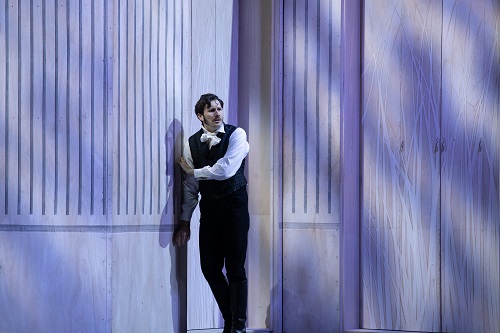
A looping forestage which embraces the orchestra ‘pit’ offers directors the opportunity to weaken the ‘fourth wall’: to intensify the spotlight on characters’ introspective reflections, heighten dramatic conflicts, and to open up fresh perspectives for both characters and audiences. Burbach wasn’t quite sure how to make the most of this aspect of the stage design, though, and some of the straying onto the front platform seemed to take place because it ‘could’ rather than because it was needed or justified.
That said, the director shapes the drama effectively, dividing Tchaikovsky’s seven ‘lyrical scenes’ into two parallel dramas of unrequited passion, in which Tatyana’s incautious declaration of love and subsequent demise is mirrored by the psychological epiphany and collapse of the man whose rejection has caused her heartbreak but who now, too late, recognises his love and loss. And, takis’ designs are stylishly simple, deftly evoking a nineteenth-century country estate, the swaying corn at the rear suggesting a working rural world. I wonder if the white cubes which form the Larins’ estate have to be turned inside-out and back-to-front with quite such frequency, however? While the re-arrangements can emphasise a character’s escape or exclusion – closing doors and walls lock out and lock in – the constant re-jigging of the set does disrupt the continuity.
What brilliantly creates atmosphere, though, is Robert Price’s thoughtful lighting and the evocative use of colour. The pale whiteness of the opening scene evokes a Chekhovian tenderness which is nurtured through the gradual deepening of colour, blossoming in the ballroom scene in which the rich, harmonious hues of the revellers’ gowns and coats are bathed in a rose-pink glow. The duel pits Lensky’s emerald-green against Onegin’s cobalt-blue. The ensuing tragedy drains life from the former and colour from the latter, so that by the close Onegin inhabits a cold world of black and white, Tatyana’s crimson gown a symbol of both her maturity and his own, self-inflicted heartache.
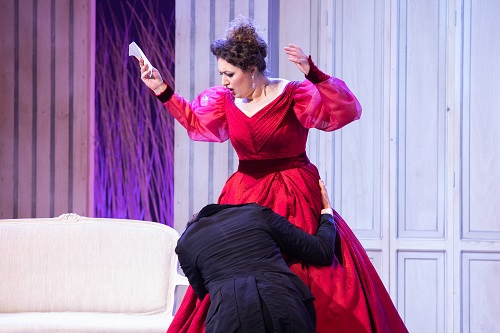
This is an unfussy production, though there are some nice touches, in particular the various ‘over-hearings’, as when Onegin hears Lensky’s plaint before duel. If one might wish for a little more ‘texture’ in the production, then Burbach introduces an interesting trope, giving literal life to inner thoughts, memories and desires in the form of prowling characters who tease, taunt and torment. Thus, as Tatyana writes her letter, so she addresses her words directly to the Onegin of her dreams; then, when he writes his own reciprocal confession of desire, he kneels, begging, clinging to her.
The handling of the duel is thought-provoking. As the combatants face each other across the wide stage, Onegin suddenly collapses to his knees, bowing forward, covering his head as if in fear, or agony. A gunshot is heard and Lensky falls. It’s as if time has played tricks: perhaps the memory of that fatal trigger-pull is too painful for Onegin to allow the image to form in his mind, and so Burbach denies us that terrible moment too, merging present and future – just as the habitual re-enactment of Lensky’s death shows us how Onegin’s present and future are thus forever haunted by his past.
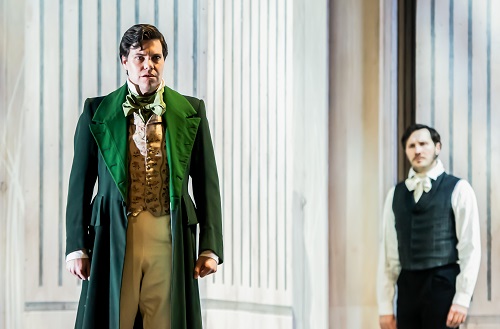
All three principals are past members of the Jette Parker Young Artists Programme at the Royal Opera and all made impressive OHP debuts here. Samuel Dale Johnson’s Onegin certainly looked the part – less vile womaniser than a man riven with doubts and vulnerabilities – and he employed his full-toned baritone to rewarding dramatic and emotive effect, rejecting Tatyana’s openness with a suave coolness, later pleading for her love with impassioned intensity. Both he and Thomas Atkins as Lensky acted with intelligence and audacity, and their duet of regret before the duel was moving in its gravity and honesty.
Atkins has a lovely strong, lithe tenor and he used it to give Lensky a pride and defiant integrity which is not always present in the characterisation of the role. Disconcertment turned to offence and then to real anger as Onegin danced flirtatiously with his betrothed, Olga. His nostalgic reflections before the duel, ‘Where have you gone, O golden days of my spring?’, were, for me, the highlight of the performance.
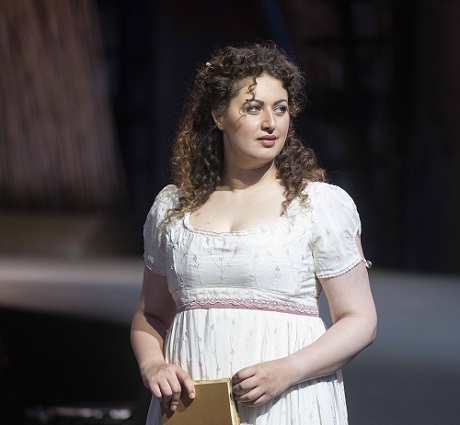
Anush Hovhannisyan was not so much a shy, tentative Tatyana in the opening scenes as a young girl overcome by her inner strength and intensity of spirit – the letter scene was intelligently and cogently articulated – but that strength served her well in the final scenes when first Tatyana’s shock upon seeing Onegin again, and then her self-possession and moral integrity in denying his beseeching, were powerfully conveyed, Tatyana’s weeping an inner anguish.
As Olga, Emma Stannard displayed vocal warmth and strength and a vivacious spirit. There was some fine character-singing, too, from Amanda Roocroft – a sharply etched Madame Larina – and, especially, Kathleen Wilkinson as a wise and maternal Filippyevna. Tenor Joseph Buckmaster eschewed caricature in Monsieur Triquet’s birthday song for Tatyana, favouring decorum and a sweetness enhanced by some lovely mezza voce delicacy. Matthew Stiff was a sober Prince Gremlin, his aria, ‘All men surrender to Love’s power’, beautifully phrased and touching for its sincerity.
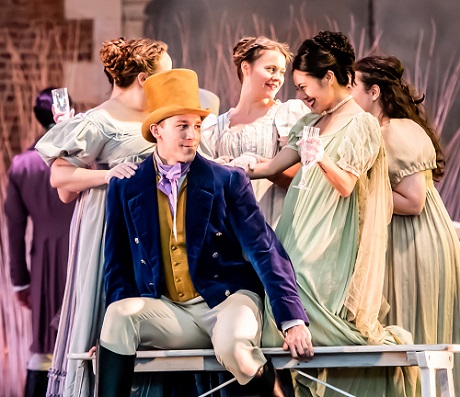
The Opera Holland Park Chorus were in fine voice, though their dancing – both in the rough and ready folk celebration of the opening scene and at the Larins’ ball – was rather leaden. Orchestral leader Gabby Painter led by example and the City of London Sinfonia played brilliantly for conductor Lada Valešová, evincing total commitment, a wide palette of colours and attentiveness to detail. The strings’ sound was juicier than their ranks might have suggested, and solos from woodwind, horns and lead cellist Rebecca Knight were confident and refined – even though lips and fingers must have been frozen. Valešová’s tempi were a bit on the steady side, though, making a long evening feel even more stretched out – though the Arctic temperature may have had been to blame for any slight sense of longueur.
As the summer warms up, though, this satisfying production will undoubtedly bring much enjoyment to audiences at Opera Holland Park. Burbach marries melodrama with realism creating a moving and persuasive tragedy of life’s mistakes, missed chances and haunting memories.
Eugene Onegin continues at Opera Holland Park until 25th June.
Claire Seymour
Tchaikovsky: Eugene Onegin
Tatyana – Anush Hovhannisyan, Onegin – Samuel Dale Johnson, Lensky – Thomas Atkins, Olga – Emma Stannard, Madame Larina – Amanda Roocroft, Filippyevna – Kathleen Wilkinson, Prince Gremin – Matthew Stiff, Triquet – Joseph Buckmaster, Zaretsky/Captain – Konrad Jaromin; Director – Julia Burbach, Conductor – Lada Valešová, Designer – takis, Lighting Designer – Robert Price, Choreographer – Jo Meredith, Chorus Master – Richard Harker, City of London Sinfonia and the Opera Holland Park Chorus.
Opera Holland Park, Kensington, London; Tuesday 31st March 2022.
ABOVE: Samuel Dale Johnson (Eugene Onegin) © Lidia Crisafulli